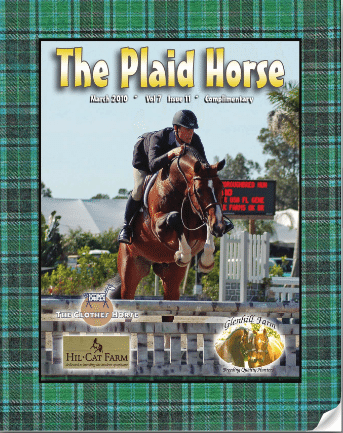by Tonya Johnston, MA
Appeared in The Plaid Horse January/February 2010
There you are, at the bottom of the list to come back for round two, or last to enter the ring for the work-off. What does that mean? In a millisecond it registers in your mind (and the butterflies start chaos your stomach): you’re on top. Fantastic! Exactly where you wanted to be, right? Or is it?
“It’s more difficult to stay on top than to get there.” – Mia Hamm
Being in the top spot is a challenge unto itself for a lot of riders, but why? Isn’t it what you worked so hard to achieve? To be sure, coming back under pressure and nailing it for the win takes mental discipline, focus and strength. Here are some useful suggestions for ways to help make that happen.
Keep It Simple
Once you realize you are sitting in the top spot, you may notice a compulsion to start thinking a lot. Making mental notes of what to do, what not to do, what to be careful of, awareness of what others are doing – the list can be endless. Instead of giving in to this over-thinking, keep your ideas simple and smart. For example, as your horse fidgets in the line-up, simplify your first priority. Decide your first task when they call your number will be to simply go forward and straight. Another example of keeping it simple would be to take one thing that you did well in the first round and focus on how to integrate that into your course plan for your second round. If your trainer gave you feedback that using your leg off of the ground at the oxers really helped your horse, then that could be a good, clear-cut thing to focus on to keep you riding effectively.
Stay Aware of How You Feel
Be sure to stay aware of how you feel mentally and physically. Are you energized? Centered? Breathing? Strong? Going in on top can hinder all of these factors and more by putting you in ‘protection mode’ where you tend to adopt a defensive attitude. When this happens you go in trying to protect your lead, instead of simply riding your best. This can manifest as tension in your muscles, curling up or adopting the ‘fetal position’, worry, self-criticism, and striving for perfection by ‘doing nothing’ (e.g. If you take your leg off and make no decision – then you won’t have done anything wrong).
In order to stay aware of how you feel, take a moment (or two) to inhale slowly as you lift your chin and open your chest. Exhale slowly through your mouth and notice how your center of gravity feels low and weighted at the bottom of your belly. Briefly look away from the ring or any action in order to direct your attention inwards, then use a positive attitude to direct the energy you feel into physical strength and confidence.
“It isn’t hard to be good from time to time in sports. What is tough is being good every day.” – Willie Mays
Follow Your Preparation Routine
Once it has registered where you are in the standings, be mindful. Take nothing for granted. Truly. Paying careful attention to details in your preparation routine is often what created the great first round ride in the first place, so stay on it. Remain vigilant and careful about your down time the night before, the morning of, and immediately before the next round. Did you eat an early breakfast? Take time alone in the tack room to listen to your iPod? At the top of every division it always comes down to the little things, both in the ring and out of the ring. Being mindful to go through every part of your pre-ride routine will help get you into your groove, and enable you to produce a stellar round.
Strive to Be Better Than Your First Round
Sitting on top going into the last round of any final, classic or championship should never lull you into thinking that you should ‘just do exactly what you did in the last round.’ This is a dangerous attitude because: 1) It is impossible, 2) it has you looking backwards instead of forwards and 3) it assumes you can’t possibly ride any better.
Let’s face it: in any performance there is always room for improvement. Each trip contains things that can be done better, opportunities to fine-tune details and smooth out the overall trip. Remember, it is the effective and assertive ride in which you are looking to improve yourself and your horse that will result in success. Going in hungry to show off what you do well, and improve on any specific areas you identified in the last round sets you up to be pro-active and ride your best.
Tonya Johnston, MA, is a Mental Skills Coach who specializes in working with equestrian athletes. Her coaching sessions teach mental strategies for optimal sport performance and help riders develop personalized preparation routines. Tonya’s clients have attained competitive success at every level, including national titles and awards. She has presented at both the USEA and USDF national conventions. Tonya has a master’s degree in Sport Psychology from John F. Kennedy University. She conducts “Mental Skills for Riders” clinics throughout the country as well as phone consultations with individual clients. Phone: 510.418.3664. www.TonyaJohnston.com


